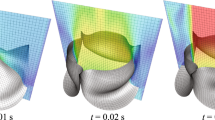Abstract
A free boundary value problem is introduced to approximate the original Thomas–Fermi equation. The unknown truncated free boundary is determined iteratively. We transform the free boundary value problem to a nonlinear boundary value problem defined on [0,1]. We present an adaptive algorithm to solve the problem by means of the moving mesh finite element method. Comparison of our numerical results with those obtained by other approaches shows high accuracy of our method.
Similar content being viewed by others
References
Thomas, L.H.: The calculation of atomic fields. Proc. Camb. Philos. Soc. 23, 542–548 (1927)
Fermi, E.: Un metodo statistico par la determinzione di alcune Proprietá dell’atome. Rend. Accad. Naz. del Lincei, Cl. Sci. Fis. Mat. Nat. 6, 602–607 (1927)
Di Grezia, E., Esposito, S.: Fermi, Majorana and the statistical model of atoms. Found. Phys. 34, 1431–1450 (2004)
Kobayashi, S., Matsukuma, T., Nagai, S., Umeda, K.: Some coefficients of the TFD function. J. Phys. Soc. Jpn. 10, 759–765 (1955)
Iacono, R.: An exact result for the Thomas–Fermi equation: a priori bounds for the potential slope at the origin. J. Phys. A: Math. Theor. 41, 455204 (7pp) (2008)
Bender, C.M., Milton, K.A., Pinsky, S.S., Simmons, L.M.: A new perturbative approach to nonlinear problems. J. Math. Phys. 30, 1447–1455 (1989)
Cedillo, A.: A perturbative solution to the Thomas–Fermi equation in terms of the density. J. Math. Phys. 34, 2713–2717 (1993)
Laurenzi, B.J.: An analytic solution to the Thomas–Fermi equation. J. Math. Phys. 31, 2535–2537 (1990)
Fernández, F.M., Ogilvie, J.F.: Approximate solutions to the Thomas–Fermi equation. Phys. Rev. A 42, 149–154 (1990)
Adomian, G.: Solution of the Thomas–Fermi equation. Appl. Math. Lett. 11, 131–133 (1998)
Wazwaz, A.M.: The modified decomposition method and Padé approximants for solving the Thomas–Fermi equation. Appl. Math. Comput. 105, 11–19 (1999)
Andrainov, I.V., Awrejcewicz, J.: Quasifractional approximants for matching small and large δ approaches. Phys. Lett. A 319, 53–59 (2003)
Liao, S.J.: An explicit analytic solution to the Thomas–Fermi equation. Appl. Math. Comput. 144, 495–506 (2003)
Liao, S.J.: Beyond Perturbation-Introduction to the Homotopy Analysis Method. Chapman & Hall/CRC, Boca Raton (2003)
Khan, H., Xu, H.: Series solution to the Thomas–Fermi equation. Phys. Lett. A 365, 111–115 (2007)
Yao, B.H.: A series solution to the Thomas–Fermi equation. Appl. Math. Comput. 203, 396–401 (2008)
Ramos, J.I.: Piecewise-adaptive decomposition methods. Chaos, Solitons Fractals 40, 1623–1636 (2009)
Desaix, M., Anderson, D., Lisak, M.: Variational approach to the Thomas–Fermi equation. Eur. J. Phys. 25, 699–705 (2004)
Mandelzweig, V.B., Tabakin, F.: Quasilinearization approach to nonlinear problems in physics with application to nonlinear ODEs. Comput. Phys. Commun. 141, 268–281 (2001)
Ramos, J.I.: Piecewise quasilinearization techniques for singular boundary-value problems. Comput. Phys. Commun. 158, 12–25 (2004)
Parand, K., Shahini, M.: Rational Chebyshev pseudospectral approach for solving Thomas–Fermi equation. Phys. Lett. A 373, 210–213 (2009)
Fazio, R.: A novel approach to the numerical solution of boundary value problems on infinite intervals. SIAM J. Numer. Anal. 33, 1473–1483 (1996)
Zhu, S., Wu, Q., Cheng, X.: Numerical solution of the Falkner–Skan equation based on quasilinearization. Appl. Math. Comput. 215, 2472–2485 (2009)
Fazio, R.: A survey on free boundary identification of the truncated boundary in numerical BVPs on infinite intervals. J. Comput. Appl. Math. 140, 331–344 (2002)
Huang, W., Ren, Y., Russell, R.D.: Moving mesh partial differential equations (MMPDEs) based upon the equidistribution principle. SIAM J. Numer. Anal. 31, 709–730 (1994)
Liang, K., Ping, L., Ong, M.T., Tan, R.C.E.: A splitting moving mesh method for reaction-diffusion equations of quenching type. J. Comput. Phys. 215, 757–777 (2006)
Wang, H., Li, R., Tang, T.: Efficient computation of dendritic growth with r-adaptive finite element methods. J. Comput. Phys. 227, 5984–6000 (2008)
de Boor, C.: Good approximation by splines with variable knots II. In: Springer Lecture Notes Series, vol. 363. Springer, Berlin (1973)
Kopteva, N., Stynes, M.: A robust adaptive method for a quasi-linear one-dimensional convection-diffusion problem. SIAM J. Numer. Anal. 39, 1446–1467 (2001)
Author information
Authors and Affiliations
Corresponding author
Rights and permissions
About this article
Cite this article
Zhu, S., Zhu, H., Wu, Q. et al. An adaptive algorithm for the Thomas–Fermi equation. Numer Algor 59, 359–372 (2012). https://doi.org/10.1007/s11075-011-9494-1
Received:
Accepted:
Published:
Issue Date:
DOI: https://doi.org/10.1007/s11075-011-9494-1



